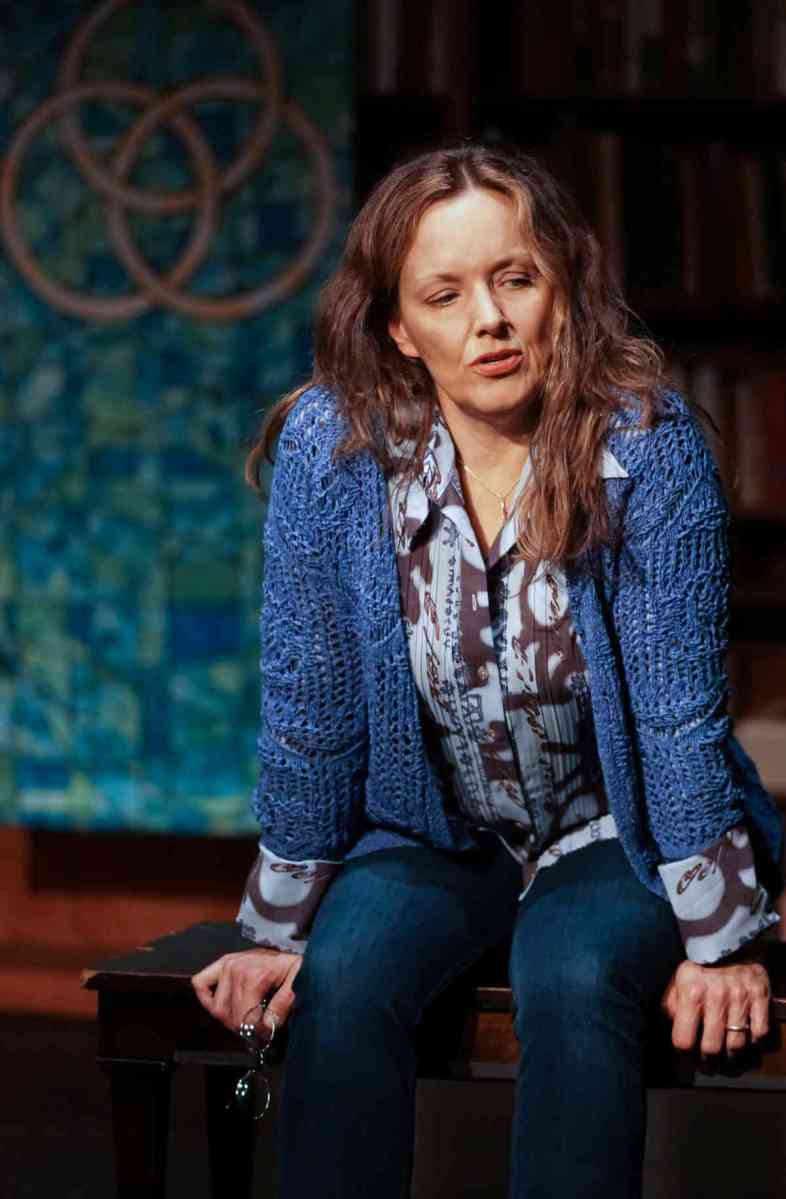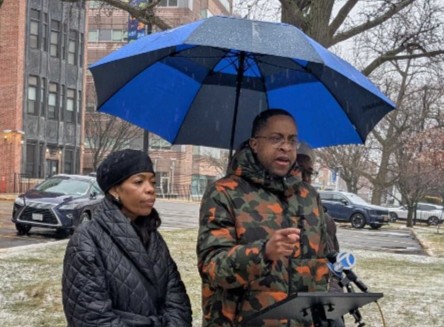To all you theater geeks out there, I want to let you in on a secret. Head on over to the charming Little Church Around the Corner on East 29th Street, climb up a narrow, creaky staircase, and you’ll discover a theater tucked under the eaves of the 1849 Neo-Gothic structure.
The space, longtime headquarters of the Episcopal Actors’ Guild, is filled with books and cases crammed with faded photos and other mementoes of acting greats (John Gielgud’s cane from the 1971 Broadway production of “Home,” for example), in addition to a modest stage and 27 folding chairs.
This storied church, also known as the Church of the Transfiguration, has long been a safe haven for social outcasts, welcoming blacks, gays, and yes, even actors, when no one else would have them. So it makes brilliant sense as the backdrop for “The Pink Unicorn,” an extraordinary, spellbinding solo show about a middle-aged Christian woman in Texas named Trisha learning to accept her 14-year-old daughter, Jolene, who suddenly went “all genderqueer on me.” Truth be told, she wished to God Jolene were normal.
The actor who portrays Trisha is none other than the über-talented Alice Ripley. That’s right, the Best Actress Tony winner for “Next to Normal,” also Tony nominated for originating the role of conjoined twin Violet Hilton in “Side Show,” has carved out time from her hectic schedule to play to a house about the size of your living room.
And what a performance! Ripley fully disappears into the role of the valiant, albeit conflicted widow (her husband died in a car wreck a while back) torn between her trans child and the local Presbyterian community bent on erasing anyone different from their own kind. Ripley lends a tender grace that makes the God-fearing, diversity-averse Trisha vulnerable and appealing, even to the staunchest atheist Yankee.
Unlike many solo shows that feature mannered impersonations of a host of characters, Ripley is always simply Trisha, clad in an ill-fitting, lilac-hued cardigan she probably knitted herself. Sure, she quotes her daughter or mother or pastor from time to time, but at most she alters her voice, as anyone would when telling a story.
Her Texas twang feels so authentic I googled Ripley to see if she grew up in the Deep South (nope, she was born in California and attended high school and college in Ohio). “I have seen her vargina,” she says, adding an “r” where there shouldn’t be one. “There’s nothing ‘boy’ about it.”
Under the thoughtful direction of Amy Jones, Ripley moves naturally around the stage, sometimes clutching her pocketbook appliqued with cheery butterflies. The only hint of a set is a couple of banners meant to evoke stained glass windows, a table, and a bench.
Trisha’s account of her stunned reaction to Jolene’s announcement is especially affecting. “How on God’s green earth can you be both a boy and a girl,” she wondered. Crisis of faith notwithstanding, she was supportive, wanting her daughter to embrace who she is and be fulfilled. She made an all-out effort to call Jolene by the preferred name, “Jo,” and pronoun, “they.” Trisha’s pigheaded mother, however, advised her to “smack that child upside her head.”
Against all odds, Trisha found herself leading the charge when the principal denied Jo’s application to start a Gay-Straight Alliance in the Sparkton, Texas, high school. She wisely partnered with the ACLU to fight the bigots. Despite being shunned by her friends and receiving death threats for supporting her “freak of nature” daughter, she soldiered on.
If the monologue feels didactic at times, expounding in copious detail on the nature of transgenderism, it is no less engaging. The exceedingly insightful playwright, Elise Forier Edie, has a keen ear for the colorful language of the South.
“Gender is on a scale, just like autism,” Trisha explains. “Only at one end is Marilyn Monroe, and on the other end is Charles Bronson, and everyone else in the world just lands somewhere in between.”
Lesbians figure prominently in the story; Trisha could not have organized a successful demonstration without them. Curiously, the only gay male mentioned is a friend of Jo’s who is “a little slip of a thing, just gayer than Christmas.” During Trisha’s elaborate account of the hordes of housewives and college students and doctors who attended the protest, she neglects to mention gay men.
Watching “The Pink Unicorn,” I was convinced it was a bio-drama based on actual events. It feels so specific, so real. Yet Edie, who played the part of Trisha in earlier productions, insists it is not one woman’s story, but a pastiche of many true stories, some ripped from the pages of headlines, some from her own life (she has a transgender child).
“All the events in this play happened to somebody,” Edie said in a press statement. “And I really do wish we could find a way to talk about it. I really do wish we could live in a world where diverse people, with all their different points of view, could walk and talk together.” Amen to that.
THE PINK UNICORN | Out of the Box Theatrics | Episcopal Actors’ Guild, 1 E. 29th St. | Through Jun. 2: Wed.-Sat. at 7 p.m.; Sat. at 2 p.m. | $29.50-$99 at ootbtheatrics.com | Niney mins.; no intermission





